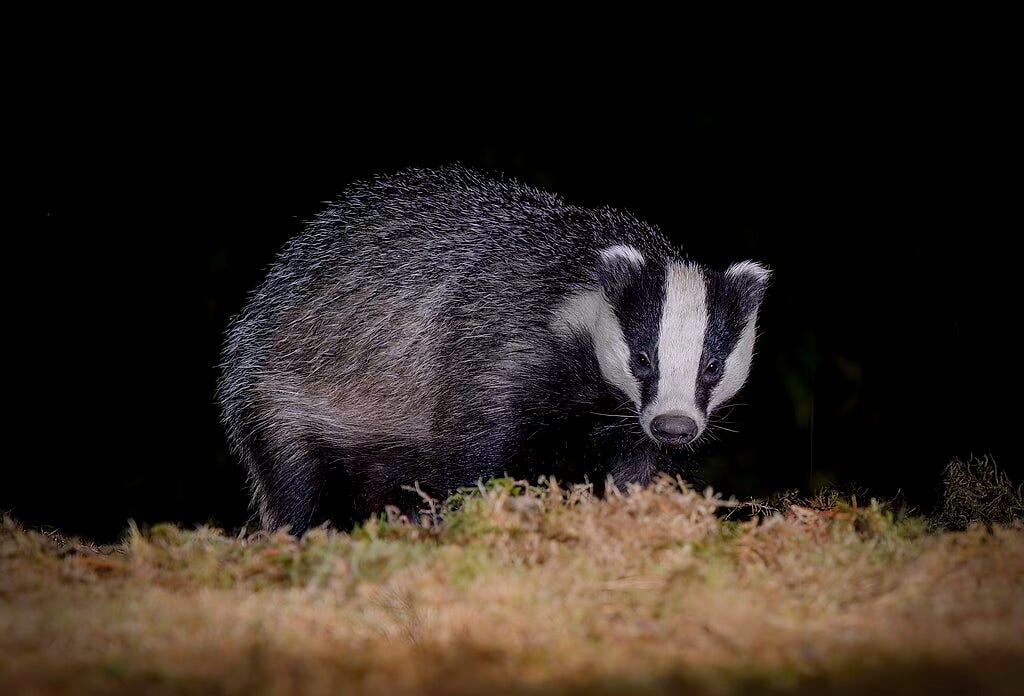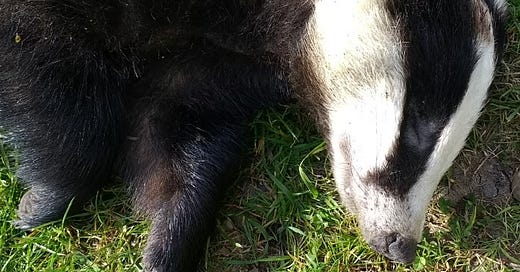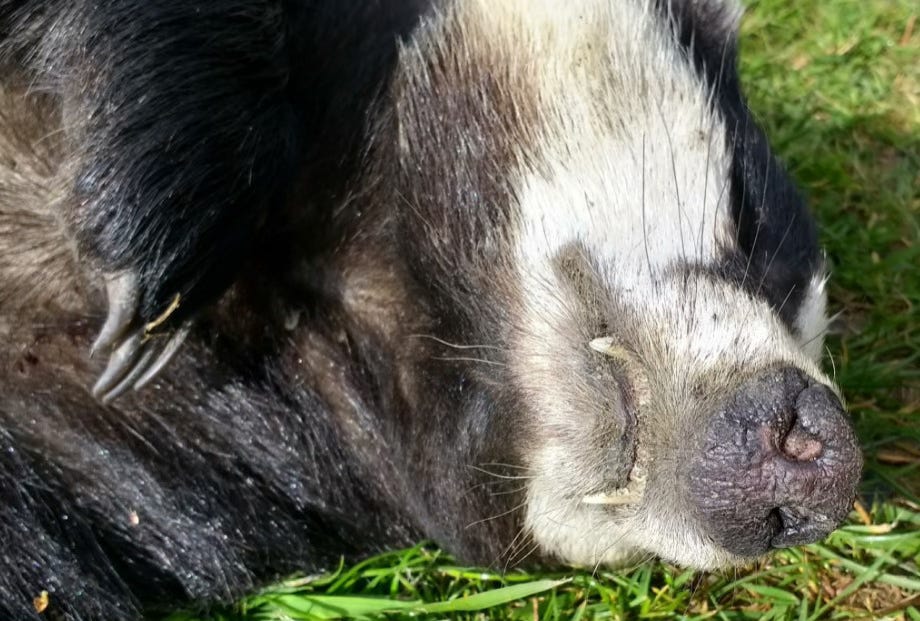Controversy hits badger cull just days into latest round of killing
The cull policy, which has killed more than 230,000 badgers, is under fire again.
A further months-long round of badger killing began in England on 1 June. Less than a week into the cull, controversy hit. Documents acquired through Freedom of Information (FOI) requests revealed that Natural England approved the cull licences against the advice of its own Director of Science.
The revelations have augmented long-standing concerns that the badger cull is a politically-driven policy, rather than being grounded in sound science. Born Free’s head of policy, Mark Jones, said:
By choosing to ignore the advice of its own Director of Science, those charged with issuing licences at Natural England have confirmed what we have always argued – that the mass slaughter of badgers is being used as a political tool to appease elements within the farming industry, rather than having a sound scientific basis.
Protected and persecuted
Badgers are a protected species in the UK. Despite this, they are subject to extensive legal and illegal persecution in the country.
In England, badgers have been killed as part of a bovine tuberculosis (bTB) policy since 2013. The cull has dramatically expanded over the years, including into the country’s nature reserves.
The policy is based on the hotly contested premise that killing badgers can help to lower bTB in cows and has been controversial since its inception. Amid enduring opposition, the government announced a phase-out of the existing cull in 2021, with the start of 2026 pinpointed as an end date.
New bTB policy proposals for 2026 onwards are currently under consultation, which include plans for continued culling.
In February, Natural England signalled that it was considering authorising further supplementary cull licenses in several counties. Supplementary culls take place in areas that have previously been subject to four-year-long ‘intensive’ culling.
Natural England is both the government’s nature conservation advisor and the wildlife licensing authority.
The documents acquired through FOI requests confirmed that the body ultimately authorised 26 supplementary cull licences for 2024. 17 of these were for areas that had existing supplementary culling licences and nine were for areas starting supplementary culls for the first time.
Under the government’s current policy, supplementary culls typically run for more than one year, although they have to be authorised annually.
Given that Natural England has been licensing culls for over a decade now – and the government plans for it to continue doing so up to January 2026 – these approvals are not particularly surprising.
However, the documents show that the body’s Director of Science, Dr Peter Brotherton, advised Natural England against approving these culls – but his advice wasn’t heeded.
Culls are not justified
Natural England sought advice from Brotherton when considering whether to grant the licences. His conclusions were based on his own assessment of the evidential basis for issuing licences and input from Natural England’s specialist evidence review team, which Brotherton commissioned to do an appraisal of evidence relevant to the licensing decision.
Brotherton advised Natural England that authorisation of supplementary culls in 2024 would not be justified. He argued that the disease reduction benefits of steps already taken would likely be felt for years to come and pointed to alternative measures, such as badger vaccination, alongside continued cow-focused interventions, as the way to control bTB moving forward.
After seeing Brotherton’s conclusions, the Department for Environment, Food and Rural Affairs (Defra) wrote to Natural England to offer its own assessment. It struck a different tone, arguing that abrupt changes to the current policy, meaning continued intensive and supplementary culling up to January 2026, would “seriously undermine our ability to engage constructively with the [farming] industry on future disease control interventions,” such as badger vaccination.
The department also said that badger vaccination was not yet ready to scale up.
Stop culling immediately
Ultimately, Natural England proceeded with licensing the culls, against the advice of its own Director of Science. The body said this was partly because it could not conclude that alternative measures will be “operationally ready to maintain the reduced disease risk at the scale required.”
Approached for comment, a Defra spokesperson said:
Bovine TB is one of the most difficult and intractable animal health challenges the livestock sector in England faces today, causing considerable trauma for farmers and costing taxpayers over £100 million every year.
We have followed a holistic approach with badger vaccination, improved cattle testing, helping farmers improve biosecurity, and working towards deployment of a cattle vaccine, alongside the current badger control policy.
However, conservation ecologist Tom Langton, who obtained the documents in question, told the Guardian:
All badger culling should stop immediately until the chaos of wasted public funds and cruel badger killing methods are properly investigated.
Similarly, the Badger Trust called on Natural England to “stop this needless badger cull immediately” in a letter to the body following the revelations.
It’s not the badgers
Langton teamed up with Born Free’s Jones, who is a veterinarian, and veterinarian Iain McGill, to produce an in-depth study on bTB and the badger cull in 2022. It found that the most likely explanation for a reduction in bTB rates on farms over the last decade or so is an intensification of cow-focused measures, such as subjecting them to more bTB testing. The study found no evidence that badger killing has contributed to declines in the disease.
For this reason, Langton takes issue with the idea that widespread badger vaccination is necessary as an alternative measure to killing the wild animals. He tells The 4 Percent:
If badger culling doesn’t work, then there’s no reason why badger vaccination should work, because it’s not the badgers.
Nonetheless, Defra insists that badger culling is key to tackling bTB in cows. In the consultation document for its new policy proposals, the department’s secretary of state, Steve Barclay, told prospective consultees that the cull has been a “major element” of successful bTB reductions.
Citing a study from Defra’s Animal and Plant Health Agency, he wrote in a foreword:
The latest evidence from the first 52 cull areas shows that rates of bovine TB breakdowns in cattle are down on average by 56% after four years of culling.
However, this does not fully reflect the findings of the study in question, as Brotherton pointed out.
In his advice to Natural England, the Director of Science expressed disappointment that this study has been characterised as offering evidence that badger culling is responsible for a 56 percent reduction in bTB incidence. In reality, he said:
the study shows the overall impact of implementing a range of bTB control measures, not culling alone. Further research to establish the relative disease reduction contributions of the different control measures is needed.
Another ‘must’ for Defra
In his foreword for the consultation, Barclay asserted that badger killing “must continue'“ in the future approach for tackling bTB in cows.
Conspicuous by its absence from Barclay’s comments is another ‘must’ for the government, namely that it must protect badgers due to its obligations under national law and the Bern Convention, an international agreement.
Badgers are a protected species under the Bern Convention and as a signatory, the UK has certain legal commitments. When it comes to lethal exploitation of badgers, such as the cull, this means that the government must not devise or take measures capable of causing serious disturbance to, or the local disappearance of, their populations.
Critics have regularly warned of the conservation impacts of the cull, for badgers and other species. Indeed, three nonprofits – Born Free, the Badger Trust, and Eurogroup for Animals – made a complaint to the Bureau of the Bern Convention in 2019, arguing that the cull policy risked local extinctions and a national population decline.
Defra insists that Natural England monitors the cull closely to ensure that local extinction is avoided.
The Bureau of the Bern Convention has put the complaint on stand-by, pending what direction the government ultimately takes with its new bTB strategy.

The government’s proposals are now effectively on hold, due to an upcoming general election. As outlined in the consultation document, Defra’s proposed way forward includes plans for ‘targeted’ badger killing in ‘cluster’ areas where “evidence suggests badgers are a part of the problem in the spread of disease,” followed by vaccination of remaining badgers.
Although the plans could change based on consultation responses, they currently do not set any limits to the number of clusters that may be licensed to kill badgers in any given year, nor do they point to a limit on the percentage of badger populations that can be killed in clusters.
Natural England usually sets both minimum and maximum kill thresholds for cull areas. These are meant to ensure that 70 percent of the targeted badger populations are killed, while leaving enough badgers standing to ensure survival of the population.
Used as a scapegoat for far too long
As Langton has pointed out, the new plans build on a trial that took place in Cumbria, which differed to culls elsewhere in that there was no cap on the number of badgers that Cumbria could kill.
Langton has described Cumbria’s strategy as “badger scorched earth,” adding that the plan there was to “remove them completely and that is what they did.”
Defra says its intention has always been to lower badger populations in culls, not to remove them entirely, and that this is also the case for the new proposed policy.
However, the cull policy has so far killed more than 230,000 badgers in England, which amounts to over half of the UK’s entire population, according to the most optimistic total population estimates.
Moreover, the government has permitted this large-scale persecution of a protected species without any scientific certainty that the killing serves its purported purpose. Indeed, there is ample and mounting evidence to the contrary, which points to cow-focused measures as the key to tackling bTB.
Considering all this, any attempt by an elected government after the election to continue down the path of badger culling will likely meet with substantial public and legal opposition.
After more than a decade of relentless killing, many believe, as Born Free’s Jones put it, that “badgers have been used as a scapegoat” for far too long.






They’ve shot the badgers to the brink of extinction by shooting at night using thermal technology for 4x6 week periods over 4 years but the fox gets the same persecution 24/7/365 and foxes are pretty much extinct in rural areas but nobody seems interested 🤷🏼♂️all the sabs are still sabbing hunts (which hardly catch any foxes) but nobody does anything about the barbaric persecution which goes on everywhere! This rifle shooting at night needs to stop before it’s too late ! At the very least we should be campaigning for seasons for foxes so they at least get chance to breed in peace as that’s what happens in most European countries. It won’t sort this mess out but it’s a start and a step in the right direction !
So very very disgusting and sad and so wrong. shameful and its murder of innocents